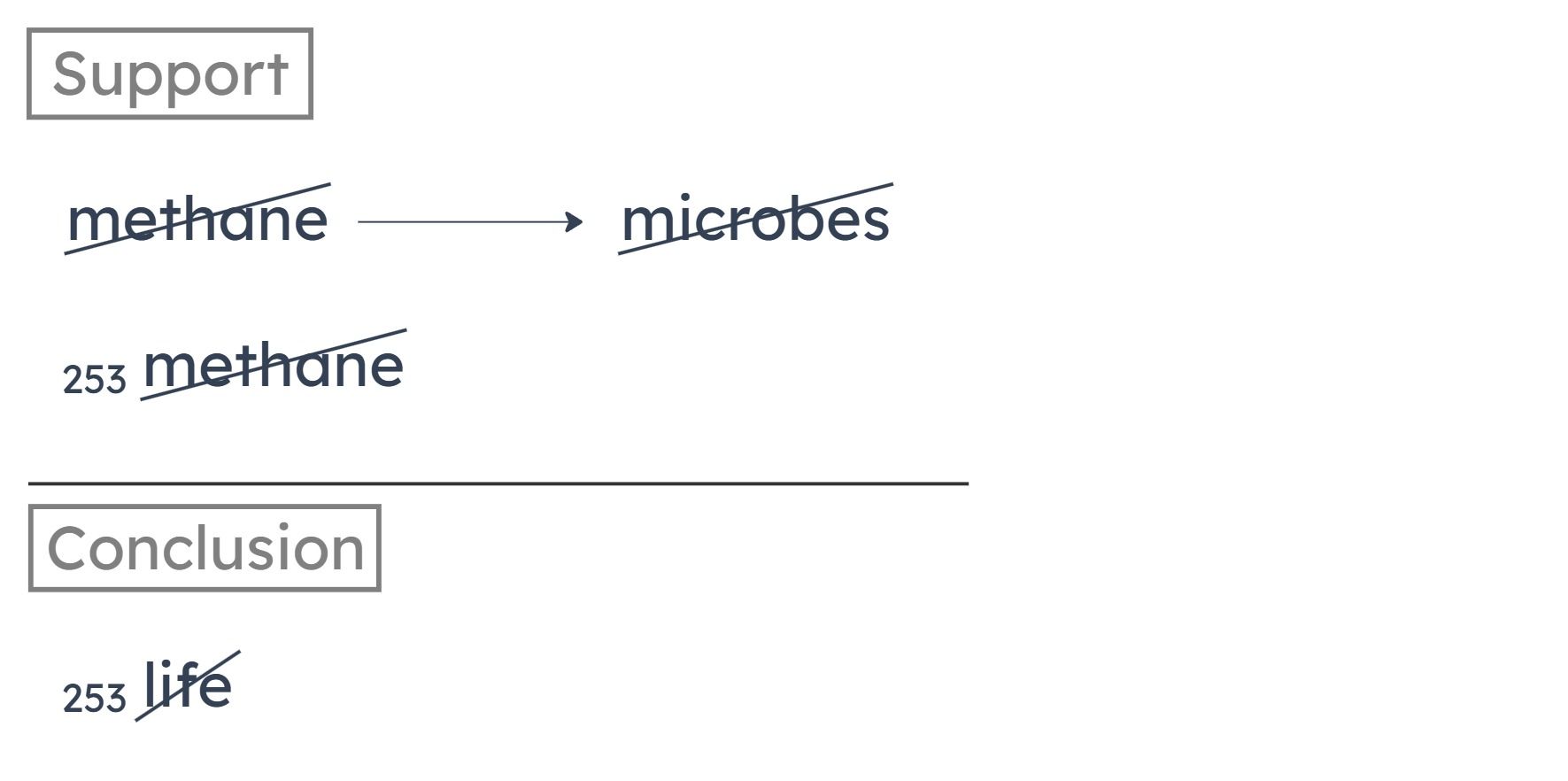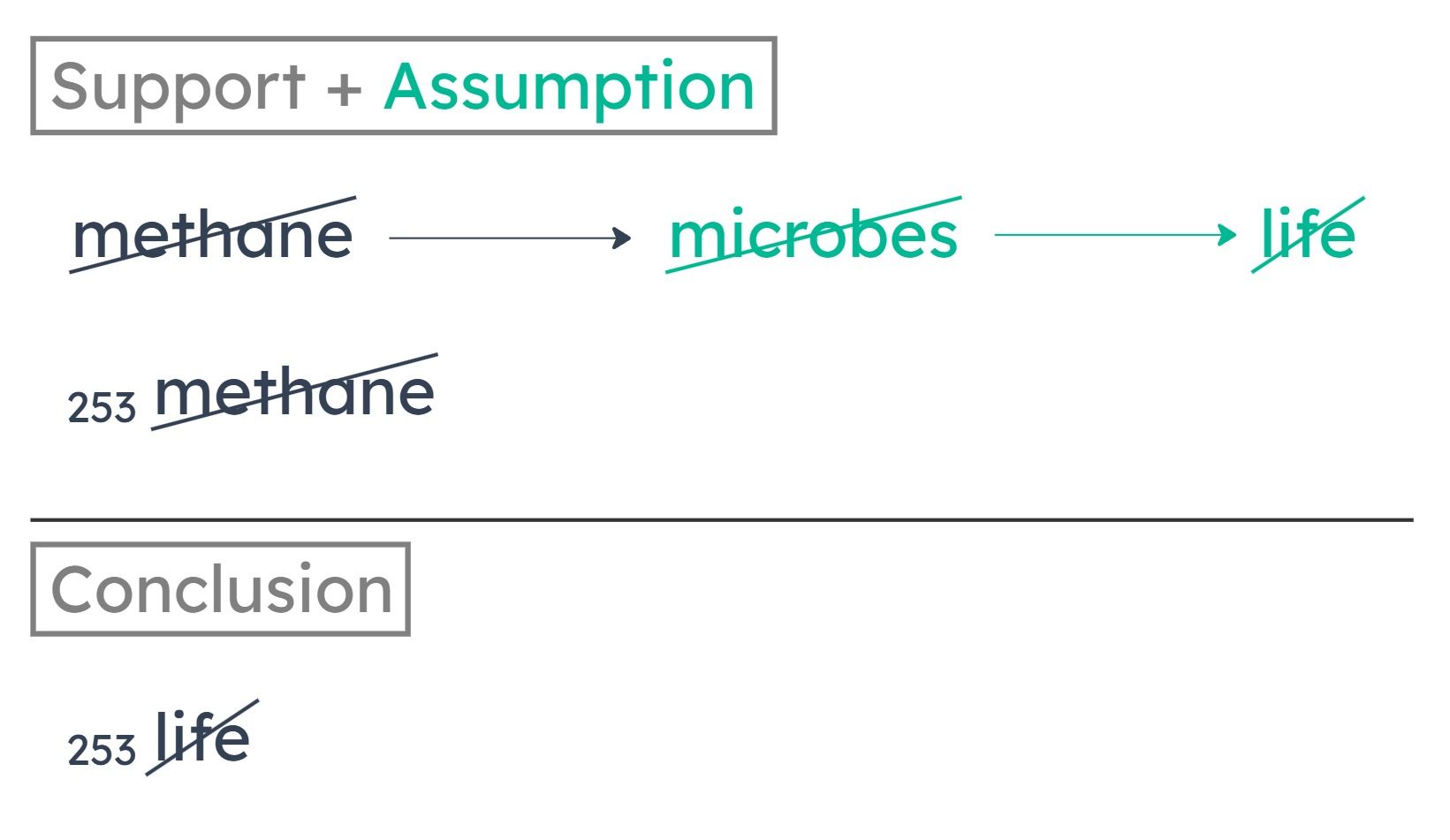Summarize Argument: Phenomenon-Hypothesis
The author hypothesizes that experiencing a traumatic event can affect how much cortisol one produces in response to stress. This is based on the fact that people who have experienced a traumatic event but don’t develop PTSD tend to produce higher levels of cortisol in times of stress than do people who haven’t experienced traumatic events.
Notable Assumptions
The author assumes that people who have experienced traumatic events without developing PTSD are representative of people who have experienced traumatic events generally (i.e. including those who did develop PTSD) with respect to the amount of cortisol produced in times of stress. The author also assumes that there isn’t another explanation for the correlation observed between cortisol amounts produced and experiencing a traumatic event without PTSD.
A
Medical conditions sometimes affect how much cortisol people who have not experienced a traumatic event produce in response to stress.
“Sometimes” could just be a single occasion. We don’t have any reason to think these conditions occur often enough to explain the lower average cortisol production of the group of people who haven’t experienced traumatic events.
B
Producing more cortisol than average in response to stress helps prevent a person from developing PTSD as a result of experiencing a traumatic event.
This raises the potential of reverse causation. Maybe people who start off producing more cortisol are more likely to avoid PTSD after trauma. This might be explain why the trauma + no PTSD group has higher cortisol production than the group that didn’t experience trauma.
C
People experiencing a traumatic event produce more cortisol than they would under less severe instances of stress.
If anything, this might support the alleged connection between traumatic events and producing more cortisol in times of stress.
D
Many effective treatments for PTSD are designed to reduce how much cortisol those with PTSD produce when exposed to stress.
The comparison in the stimulus involves people who don’t have PTSD. So they wouldn’t be taking the medications described in (D).
E
Experiencing a traumatic event can damage the gland that produces cortisol, resulting in that gland producing more cortisol.
This strengthens the argument by providing a causal mechanism for how experiencing trauma might lead to more cortisol production in times of stress.
Summary
Commercial fishing equipment became more technically sophisticated from 1960 through 2010.
The commercial fishing industry has been able to harvest a greater percentage of the total amount of fish in the ocean by weight each succeeding year from 1960 through 2010.
The industry’s harvest by weight increased from 1960 until 1995,
The industry’s harvest by weight did not increase from 1995 through 2010.
Notable Valid Inferences
From 1995 through 2010, each year, the industry harvested a greater percentage of the total amount of fish in the ocean (by weight), but the amount of fish harvested by weight did not increase. This means that the total amount of fish by weight in the ocean decreased each year from 1995 through 2010.
A
After 1995, the number of fish harvested each year by the commercial fishing industry increased, but the average weight of each fish harvested decreased.
Could be false. All of the information in the stimulus is about fish by weight; we have no information about the number of fish harvested or the average weight of each fish.
B
After 2010, improvements in commercial fishing equipment did not enable the fishing industry to harvest a greater percentage of the total amount of fish, by weight, in the world’s oceans.
Could be false. The stimulus does not provide information about what happened technologically after 2010.
C
The total amount of fish, by weight, in the world’s oceans decreased during the period from 1995 to 2010.
Must be true. In order for it to be true that the industry harvested a greater percentage of the total weight of fish in the ocean, but the amount of fish harvested by weight did not increase, it must be the case that the total amount of fish by weight in the ocean decreased.
D
The commercial fishing industry’s harvest, by weight, was significantly lower in 2010 than it was in 1995.
Could be false. We know that the commercial fishing industry’s harvest by weight was not higher in 2010 than it was in 1995, but it could be true that the harvest was the same or only slightly lower.
E
No significant improvements in commercial fishing equipment occurred before 1960.
Could be false. We know that the technical sophistication increased steadily from 1960 through 2010; we don’t have any information about the equipment before 1960.
Summary
The author concludes that if there’s no methane on Planet 253, then there is no life on Planet 253. Why? Because if there is no methane, then there are no microbes.

Missing Connection
We know that if there’s no methane, there’s no microbes. But how does this imply that if there’s no methane, there’s no LIFE? “No life” is a new concept in the conclusion. So, at a minimum, the correct answer must tell us what is sufficient to lead to “no life,” or what is required in order to have “life.”
To go further, we can anticipate a more specific connection. We already know from the premise that “no methane” implies “no microbes.” To get to “no life,” we just want to establish that “no microbes” implies “no life.” In other words, that life requires microbes.
To go further, we can anticipate a more specific connection. We already know from the premise that “no methane” implies “no microbes.” To get to “no life,” we just want to establish that “no microbes” implies “no life.” In other words, that life requires microbes.
A
There is, in fact, no methane on Planet 253.
The conclusion is conditioned on the hypothetical that there is no methane on Planet 253. Whether this hypothetical is true doesn’t prove the conclusion, because the conclusion already presumes that it’s true for the purpose of the argument.
B
If methane exists on Planet 253 then we would be able to detect its presence.
(B) doesn’t establish what is sufficient to lead to “no life.” Since neither this answer nor the premises establish what leads to “no life,” (B) cannot make the argument valid.
C
If there is no methane currently on Planet 253 then there has never been methane on Planet 253.
(C) doesn’t establish what is sufficient to lead to “no life.” Since neither this answer nor the premises establish what leads to “no life,” (C) cannot make the argument valid.
D
If there are no microbes on Planet 253 then there is no life on Planet 253.
We know that if there’s no methane on Planet 253, there’s no microbes on Planet 253. According to (D), that allows us to conclude there is no life on Planet 253, if there’s no methane.

E
If there is methane on Planet 253 then there must be life on Planet 253.
(E) allows us to reach a conclusion that there IS life on Planet 253. But we want to establish that there is NO life on the planet. (E) is essentially a version of the conclusion that confuses sufficiency and necessity.
Answers (A), (B), and (D) would have been better (I dare say right) if they said something like:
Parents should encourage children to do something only if it doesn't make unhappy.
Parents should encourage children to do only those things that don't lead them to develop a sense of resentment.